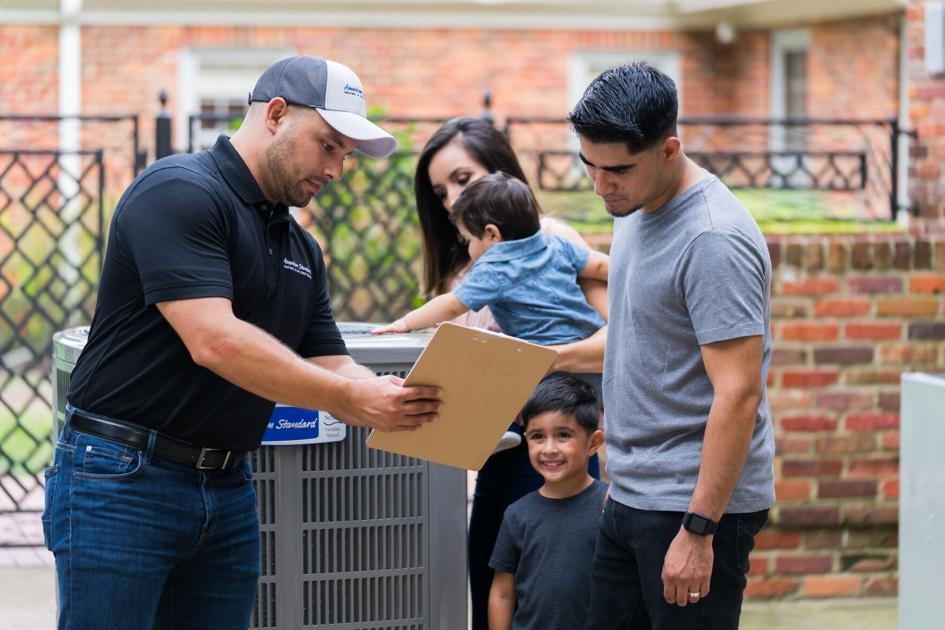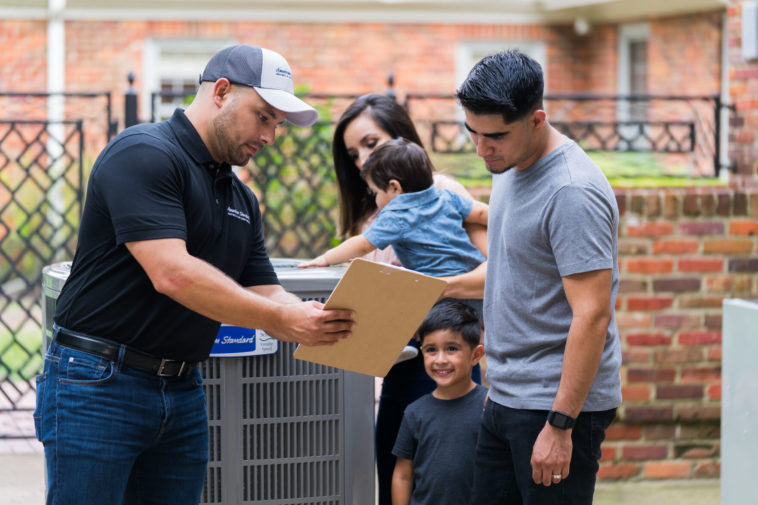At Home: New HVAC system trips heated discussion

I would like the record to show that I was against replacing our heating and air conditioning system. For once, my husband wanted to spend money on a home improvement that I didn’t.
I come from the if-it’s-not-broken-don’t-fix-it school. He comes from the let’s-not-wait-till-it’s-a-problem school. I also prefer buying home improvements you can see, not ones you work to hide.
I further blame the HVAC company. (We’ll call them Company No. 1.) Last year, when a service representative came out to see why our system wasn’t cooling, he found a slow refrigerant leak. He also took pictures of the inside of our 18-year-old unit. He did this to scare me.
“What are all those spots?” I asked.
“Corrosion, mold,” he casually answered.
Yum.
If we wanted cool air (yes), our choices were to spend $500 to replenish the refrigerant or spend $13,000 (cough, sputter, hack, sell a kidney) for a new system. Or we could buy a Company No. 1 membership for $200 and save half on the cost to replace the refrigerant plus get two free service maintenance calls in the coming year and a discount on future purchases. Swayed by the immediate savings, we bought the membership and replaced the refrigerant.
Then came the phone calls. Company No. 1 kept wanting to schedule a service call. I kept putting them off. Finally, they got through to my husband, who succumbed.
“Why?” I said. “You fell in their trap!”
“We already paid for it,” he said.
“They are just trolling for business!” I said. A career in journalism has turned me into a bitter skeptic.
“They are doing their job,” he said. His sensibleness can be infuriating.
And what do you suppose happened? They recommended we replace our old, dilapidated, rusty, corroded unit. And guess who took the bait?
“But it’s not broken!” I argued.
“But it will be,” he said.
“Why don’t we wait until it stops working?”
“Because I don’t want it to go down during a heatwave when service companies are booked for weeks and listen to you fuss because the house is so hot.”
He got an estimate from Company No. 1, which was not on my good side.
“At least get another estimate,” I said.
He called Company No. 2, which offered a better system for the same price. Despite our member discount, Company No. 1 could not meet or beat the offer, which gave me some satisfaction that I cannot quite explain.
The new system went in last week. The air in the house feels the same.
To feel better about foregoing vacations for the rest of my life to pay for new machinery, I talked with Kellie Lindenmoyer, furnace product manager for American Standard Heating & Air Conditioning, who cooled me off and answered these homeowner-related questions:
Q: How often do HVAC systems need replacing?
A: Typically, systems last 15 to 20 years, especially if serviced regularly. How often you use the system has an impact. For instance, a system in a vacation home that you use three months of the year won’t need replacing as often.
Q: How do you know whether to repair or replace?
A: If your system is in that 15- to 20-year range and has recurring issues, it’s probably time. Talk to a service pro about your options. Replacing will cost more but will be better long-term because you will save on repairs and might also see lower energy bills. Some use the $5,000 rule. Multiply the age of your unit in years (say 18) by your estimated repair cost ($300). If your total is more than $5,000, (our example comes to $5,400) then consider replacing your system.
Q: How much can a homeowner expect to pay for a new system?
A: Depending on the equipment and where you live, estimates for a residential system, including installation, range from $4,600 to $14,000.
Q: When you do spring for a new unit, what benefits can you expect?
A: Peace of mind: If you replace your system before it quits working, you won’t wake up in February freezing because your system broke in the night nor will you sweat out waiting for a service call in August.
Lower energy bills: Thanks to regulatory changes, modern systems are more energy-efficient. How much you save on your energy bill will depend on your home’s insulation, your usage and how many more “SEERS” your system has. The higher the SEER (Seasonal Energy Efficiency Ratio), the greater the savings (and the more expensive the unit). In Florida today, the minimum SEER allowed is 13.
Cleaner indoor air: Newer systems do a better job removing allergens and pet fur from the air. Some systems clean air better than others, so if you have pets, allergies or asthma, ask your dealer about indoor air quality.
Better resale value: A new HVAC system will add value when you want to sell your home.
Marni Jameson is the author of six home and lifestyle books, including “Downsizing the Family Home — What to Save, What to Let Go” and “Downsizing the Blended Home — When Two Households Become One.” Reach her at marnijameson.com.
Published at Sat, 20 Feb 2021 07:00:00 +0000






Comments
Loading…